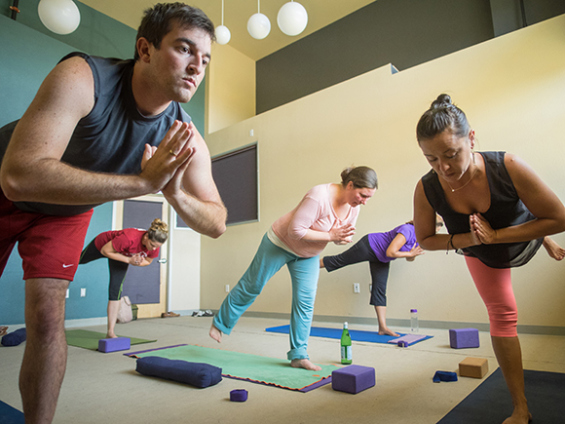At the San Luis Obispo headquarters for international software company Mindbody, employees can break away for noontime yoga or retreat to one of the building’s downstairs spa rooms for a massage or facial.
Amid high ceilings, colorful beanbag chairs and exercise balls, employees at Mindbody are working in an atmosphere that’s anything but the typical maze of white-walled cubicles. Along with an in-house café, a “recess room” in the building includes Foosball and ping-pong tables and perks such as Frisbees and board games.
Mindbody employees receive a card that’s loaded each month with $65 for wellness and beauty services including everything from facials to gym memberships.
Along with a traditional health-insurance plan, the plethora of perks ensures the health and productivity of Mindbody’s employees, said Rachel McClure, the company’s human resources program manager. “It is a recruitment and retention benefit to keep employees, “ she said. “But we also want our employees … to take care of themselves and we want to have them here for a long time.”
A 2010 Harvard University study on workplace wellness found that medical costs fall about $3.27 for every dollar spent on wellness programs, and absentee costs drop by about $2.73 for every dollar spent.

“It’s important at a number of levels,” said Greg Van Ness, CEO of Ventura-based insurance brokerage firm Tolman & Wiker. “Healthy people are not only more engaged and more productive, but they [also] generate less medical claims costs.”
At the tech startup LogicMonitor, based in downtown Santa Barbara, CEO Kevin McGibben said his main goal is “making the company culture and work environment a place where people want to be all the time.” LogicMonitor offers its employees benefits such as a fully-stocked kitchen and bar, keeping employees engaged as they perform highly technical work, he said.
“It’s a tough job and it’s an intellectually challenging job, no matter what you do in LogicMonitor,” McGibben said. “And I think the types of people we employ — they need to be challenged, and they need a certain work environment to succeed.”
The company offers a $100 monthly stipend to go toward a gym membership or parking, occasional free catered lunches and “Yoga Tuesdays” and “Basketball Wednesdays.”
At outdoor clothing and gear maker Patagonia’s Ventura campus, employees enjoy a flexible work schedule. “People take their lunches out and go out running or surfing,” said Adam Fetcher, a company spokesman. Patagonia has an onsite gym, childcare center, fitness classes for pilates or yoga, and a 24/7 nurse hotline. It stays true to its eco-friendly roots with a café that serves organic food. Employees also receive financial incentives for carpooling, biking or taking the bus to work.
CMC Rescue in Goleta, a manufacturer of search-and-rescue equipment, has a “work fit” room, a loaner bike program, rock-climbing wall and outdoor basketball area. “We’ve been introducing more healthy snacks … and next year, we’re going to start a wellness program and implement a walking program where employees wear pedometers to track their steps each day,” said Debbie Horne, CMC Rescue’s director of human resources.
At Horny Toad, an activewear company, many employees enjoy hiking or biking in the hills of Santa Barbara around its campus. Weekly food trucks and activities such as staff bike rides are great perks, but the company’s human resources manager, Carlynn Rose, said wellness is entrenched in Horny Toad’s corporate culture. “We believe in working hard and playing hard,” she said.
Goleta-based Deckers Outdoor Corp. is one of the largest publicly-traded firms based in the Tri-Counties, but the Ugg brand parent believes the little things — onsite massages for employees and the occasional manicure and pedicure — are an important part of its corporate culture.
The company also offers an educational and lifestyle-management program for expecting mothers and a program that allows employees with chronic conditions such as diabetes to contact a specialized, onsite nurse at anytime.
Deckers hosts programs for “financial wellness,” with seminars on topics such as saving for retirement. “If you’re OK financially, then everything else is impacted,” said Julieth Chambers-Osman, global benefits and mobility manager for Deckers. “Our employees are our most-valued asset, and if they’re not having a well-balanced life mentally, physically and spiritually, we need to help them access those things that are important to life.”
Workplace wellness programs are on the rise. The Harvard study found that just 19 percent of companies with more than 500 workers had wellness programs in 2006, while 77 percent of large manufacturing employers had such programs in 2008.

Software firm Citrix Online, which employs hundreds of people in Goleta, gathered employee input and crunched the numbers before launching its corporate wellness program. “We looked at our costs and how to keep those costs in check and reduce them,” said Kate Stemle, a health and wellness consultant at Citrix.
Citrix has massage services and an onsite gym — perks that are becoming increasingly commonplace at larger tech firms — as well as a program through which employees can earn prizes for tracking their exercise.
Van Ness, the insurance broker, said wellness programs can actually lower a company’s insurance costs by promoting a healthier workforce. “Prevention is the holy grail. If you improve prevention, you improve the picture for everybody in every way,” he said.

